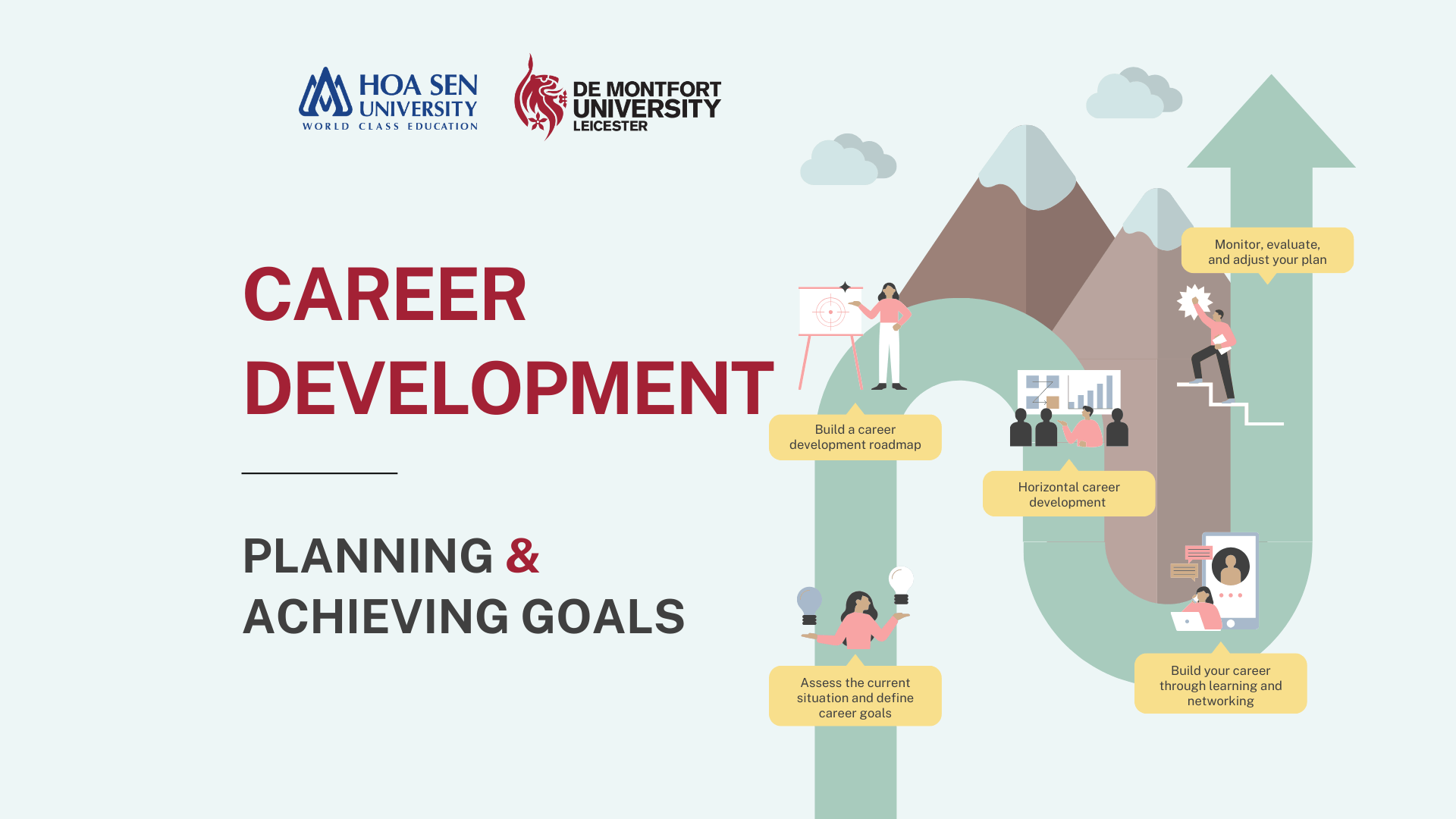Career Development: Planning and Achieving Goals
In a competitive job market, career development is not just a dream but a necessary strategy. A concrete plan will help you set clear goals and achieve success faster. Let’s explore how to plan effectively, build a career roadmap, and develop horizontally to expand opportunities for success in the new era!

1. Why is career development planning important?
In today’s rapidly evolving job market, career development planning is no longer an option but a necessity for achieving success. Career development not only helps you shape your future path but also optimizes your skills, opportunities, and time to achieve specific career goals.
Why do many people fail in their careers? Often, it’s because they lack a concrete plan and do not know how to define each step. This leads to a lack of focus, missed opportunities when they arise, and being easily surpassed by others who have a clear plan.
2. What specific steps are needed for career development planning?
To achieve sustainable career growth and long-term goals, having a clear roadmap is essential. Here are specific steps to help you build an effective career development plan. From self-assessment to developing necessary skills and tracking progress, each step will bring you closer to your desired career goals.
2.1 Step 1: Assess the current situation and define career goals
The first and most crucial step in career development planning is to assess your current situation. Where are you in your career? What have you achieved, and what do you lack?
Take time to ask yourself: “What do I want to achieve in the next 1, 3, or 5 years?” Setting specific, measurable, and realistic goals will make it easier for you to accomplish them. For instance, if you aim to advance to a higher position in your company, identify the skills, knowledge, or certifications needed to achieve that.
When defining career goals, the SMART method (Specific, Measurable, Achievable, Relevant, Time-bound) is a helpful tool to ensure that the goals you set are clear and achievable. Specifically, the goals need to be specific (Specific) and clear; measurable (Measurable); realistic and achievable (Achievable); relevant to your career path (Relevant); and have a specific timeframe (Time-bound). For example, instead of saying “I want to advance,” you should set a goal like “become a manager in 2 years by completing a management course and developing leadership skills.“
2.2 Step 2: Build a career development roadmap
Once you’ve defined your goals, the next step is to build your career development roadmap. Break down your long-term goals into specific actionable steps. For example, if your goal is to become a manager within 5 years, you might set a short-term goal to complete a management course in 6 months and then practice leadership skills through small projects.
A clear roadmap will make it easier for you to track your progress and make adjustments as needed. Always be flexible in your planning and ready to adapt when the job market or your job situation changes.
2.3 Step 3: Horizontal career development – a new trend?
Advancing vertically (i.e., moving up to higher positions) is not the only path to success. Horizontal career development is a new trend, where you expand your skills and experiences across various fields without needing to advance immediately.
This brings numerous benefits, such as making you more versatile, increasing your personal value in the eyes of employers, and better adapting to changes in the job market. You can participate in different projects within your company or learn additional skills in related fields to broaden your expertise.
2.4 Step 4: Build your career through learning and networking
No plan can succeed if you remain static. Building a career requires continuous learning and connecting with industry professionals. Participating in courses, workshops, and professional networking events is an excellent way to expand your knowledge and build relationships.
Seek opportunities to work with those more experienced than you, learning from their mistakes and successes. Networking not only opens more career development opportunities but also serves as a motivational resource to help you overcome challenges at work.
2.5 Step 5: Monitor, evaluate, and adjust your plan
Finally, no plan is perfect from the outset. You need to continuously monitor your development progress and evaluate whether the steps taken are on the right track. If you find that you are not achieving the desired results, reassess the plan and adjust it to fit the new situation.
A flexible plan will help you quickly adapt to unexpected changes in life and work, ensuring that you always move forward without losing direction.
3. Start your career development at Hoa Sen – De Montfort international program
Are you looking to enhance your career and prepare for the future? Hoa Sen – De Montfort international program is a fantastic opportunity to equip yourself with the global knowledge and skills that the current job market seeks.
Leave your information here to learn more about the study program and the exciting career development opportunities we offer!
4. Conclusion
Career development is a long journey that requires detailed planning and patient execution. By assessing yourself, building a clear roadmap, developing skills horizontally, and continuously learning from others, you will move closer to your goals. Most importantly, be flexible in adjusting your plans as necessary to adapt to changes in the job market.
If you are seeking a quality international study program that will enhance your skills and expand your career development opportunities, Hoa Sen – De Montfort program from the UK is a choice worth considering.
Read more:
- Study International Bachelor’s Degrees in 3 Popular Majors: Marketing, International Business, Graphic Design at Hoa Sen – De Montfort
- What is On-site Study Abroad? Opportunities to Study at Home with the Hoa Sen – De Montfort Program
- Choosing On-site Study Abroad in Marketing – Exciting Career Opportunities Not to Miss
——————————————–
CONSULTATION CONTACT: Hoa Sen – De Montfort Program (Institute of International Education)
Apply online here
Register for consultation here
📍 Address: Room 1007, 10th floor, 08 Nguyen Van Trang, Ben Thanh Ward, District 1, Ho Chi Minh City Phone: 028 7309 1991 (Ext: 4792)
Hotline: 0888 275 276
Email: demontfort@hoasen.edu.vn
Website: www.hoasen.edu.vn/demontfort/











